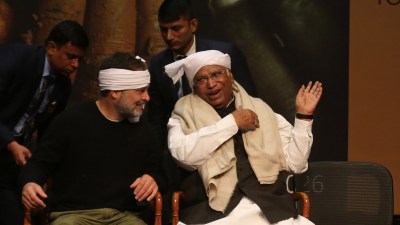Paper Messiah
A day before the city got glimpses of Jenny Pinto8217;s magic, the floor of a city studio is strewn with interesting forms in shades of ivory, cream and ochre.

Jenny Pinto8217;s tryst with paper has been anything but ordinary
A day before the city got glimpses of Jenny Pinto8217;s magic, the floor of a city studio is strewn with interesting forms in shades of ivory, cream and ochre. Forms that look like a magnified sea shell, or maybe a broken dry terrain. You are least likely to make out in the first glimpse that it is paper you are looking at. But the 49-year-old8217;s tryst with paper, made the traditional Indian way, have several such interesting stories to tell. 8220;I realized that though handmade paper was being used as a fancy commodity for some time, it had never been explored as art,8221; says Pinto.
After a long stint with television commercials in Mumbai, Pinto wanted to do something that kept her close to her roots. 8220;The feel of paper, coarse, buttery, or slippery, is pure earthy. And I love how you can play with textures when it comes to paper,8221; days Pinto. The artist uses natural fibres 8211; the leftovers from agriculture and rural cottage industry.
8220;I use layering, sculpting to play with the texture of the paper,8221; says Pinto.
Her exhibition at the Weavers Studio, called the Traces of Time, replicates the visual indicators of the passage of time. Natural landscapes those are broken, remade and broken again in the passage of time. So, if you run into cream coloured forms resembling ripples frozen on a sand bed, you also come across a collection of interesting handmade paper turned into dog-eared books. 8220;People tell me that they look like old Buddhist manuscripts,8221; laughs Pinto. In fact, Pinto8217;s collection of old, weathered books with crimpled pages are the most interesting of the exhibits.
Banana, mulberry, kora grass, jute, sisal are Pinto8217;s fodder for creativity. 8220;My favourite is banana leaf though,8221; she adds. Pinto says she tries her best to prevent for interventions like thread, wires etc. 8220;Whatever little I do, is to hold the fibres together at times,8221; she says.
Apart from projects in several states, Pinto also trains rural women who can then embark on a path of self-employment. 8220;I usually do it through NGOs. But the challenge is, most of these people come from very non-traditional crafts backgrounds and are not familiar with the process at all,8221; says the Bangalore-based artist. Her unconventional choice of career also has a lesson or tow for young entrepreneurs. It was not a school or a glitzy college that taught Pinto her craft. 8220;I read up books and stuff on the net. And we still don8217;t have proper courses on paper making in this country,8221; she rues.
- 01
- 02
- 03
- 04
- 05































